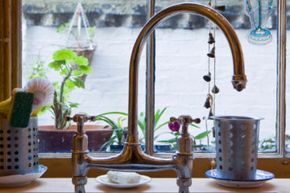 “When choosing a new kitchen faucet, there’s a lot to consider.Thinkstock/Getty Images
“When choosing a new kitchen faucet, there’s a lot to consider.Thinkstock/Getty Images
So, you’ve decided it’s time for a new kitchen faucet. Maybe it’s part of a massive kitchen renovation, maybe you’ve inherited a dilapidated, leaky faucet, or perhaps you’re just looking for an inexpensive way to update. Whatever the case, you might feel overwhelmed by the sheer number of choices you face. If you last contemplated kitchen faucets in 1978 — or, for that matter, 1998 — you’ve probably realized that it’s a whole new world out there. Do you want a pull-down spray spout or a side-mounted one? What materials do you need to look for? We’ve compiled a handy guide to shopping for a new kitchen faucet — from spray hoses to built-in water filters.
First up: evaluating your faucet situation.
Contents
- Evaluating Your Current Kitchen Faucet Situation
- Understanding Kitchen Faucet Features
- Understanding Kitchen Faucet Styles
Evaluating Your Current Kitchen Faucet Situation
When you’re thinking about a faucet upgrade, the first thing you need to consider, of course, is your existing sink. Do you want to overhaul everything or work with the sink you have? If you’re sticking with what you have, you can use the holes that are already in the sink deck or add more — it’s not a make-or-break situation if you want to add a spray hose or sink dispenser. However, if you’re planning to make the leap from a deck-mounted faucet to a wall-mounted one, you’ll most likely have to spring for a new sink, too. Style is another aspect to keep in mind — a shiny, high-tech faucet probably won’t look right with your white cast-iron farm sink. Likewise, an antique-style brass faucet would be out of place with a stainless-steel sink. Just something to keep in mind.
What features should you look for in a new faucet? Find out on the next page.
Farmhouse Sinks
Farmhouse (or apron-front) sinks are the next big thing in the sink world. But installing one might require more work than you’re ready for — because they’re oversized and have a front panel, they often need to be mounted along with the countertops.
Understanding Kitchen Faucet Features
Even if you have a general idea of the faucet you want, it helps to be specific when you’re faced with an enormous selection online or at your local big-box home improvement store. Here are three basic points to help narrow things down:
- Spout type — The trend is definitely for a pull-down spray attachment, but you can also go for a side-mounted spray hose.
- Spout height — High-arch spouts (10 to 18 inches) are in right now. Consider the size of your sink here — how big of an area does the spray need to cover?
- Number of handles — If you choose a pull-down faucet, you’ll have only one handle, but you can still get faucets with traditional hot and cold handles.
So, those are the fundamentals, but there are many mind-boggling (and high-tech) choices beyond that. You can pay extra for spray volume control, water pause buttons, built-in water filters, touch-sensitive controls and hands-free operation, among others. For example, the Kohler Karbon faucet is a futuristic apparatus that boasts five pivoting joints for "precise water delivery."
Next up: faucet styles, materials — and prices.
Understanding Kitchen Faucet Styles
Now that you’ve navigated through the basic faucet features, it’s time to think about materials and style. If you’re aiming for longevity (and you should be), focus on faucets made of solid brass with ceramic disc valves that control water flow. Style is obviously more of a personal thing — chrome-plated brass has been the most popular finish for years, but the less-shiny satin nickel and bronze have been catching on recently. Spouts with stainless-steel hoses tend not to kink as much as others.
Prices are all over the place — you can spend as little as $50 on a model with plastic internal components, or $3,400 on an artisanal faucet inspired by "1920s French country kitchens" [source: Pandolfi]. In general, though, you should be able to score a solid, reliable faucet for $200 to $300.
For more on faucets and related home topics, visit the links on the following page.
Pot Fillers
Homeowners going for the "professional kitchen" look are increasingly opting for pot-filler faucets that are mounted over the cook top or stove range. Sounds convenient, but some kitchen designers nix them because of the extra plumbing they require — and because people often don’t use them as much as they think they will.
Choosing Kitchen Faucets: Lots More Information
Related Articles
- How to Design a Kitchen
- How to Repair a Faucet
- 5 Home Repairs You Really Should Know How to Do Yourself
Sources
- Beamon, Kelly. "Pull-Down Kitchen Faucets." This Old House. (Accessed Aug. 18, 2010) http://www.thisoldhouse.com/toh/photos/0,,20255850,00.html
- Donegan, Fran J. "Buyer’s Guide to Kitchen Sinks." This Old House. (Accessed Aug. 18, 2010) http://www.thisoldhouse.com/toh/article/0,,219963,00.html
- Garceau, Alicia. "Choosing the Right Kitchen Sink and Faucet." HGTV.com (Accessed Aug. 18, 2010) http://www.hgtv.com/kitchens/choosing-the-right-kitchen-sink-and-faucet/index.html
- Kohler.com. "Kitchen Products: Faucets. Karbon." (Accessed Aug. 18. 2010) http://www.us.kohler.com/faucets/karbon/index.jsp
- Kohler.com. "Kitchen Products: Faucets. Selection Guide." (Accessed Aug. 18, 2010) http://www.us.kohler.com/onlinecatalog/buyguide/kitchen_sink_faucets1.jsp
- National Kitchen & Bath Association. "Kitchen Faucet Trends." (Accessed Aug. 18, 2010) http://www.nkba.org/consumer_tips_articles_faucet.aspx
- Pandolfi, Keith. "The World’s Most Expensive Home Products." This Old House. (Accessed Aug. 18, 2010) http://www.thisoldhouse.com/toh/photos/0,,20363548_20775353,00.html
- RemodelingCenter.com. "25 Facts About Kitchen Faucets." (Accessed Aug. 18, 2010) http://www.remodelingcenter.com/kitchen/sinks-faucets/25-facts-about-kitchen-faucets/
- Rodriguez, Natalie. "Hands-Free Faucets." This Old House. (Accessed Aug. 18, 2010) http://www.thisoldhouse.com/toh/article/0,,1561997,00.html

































